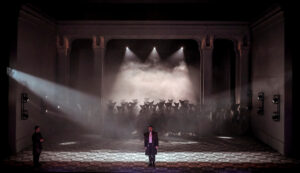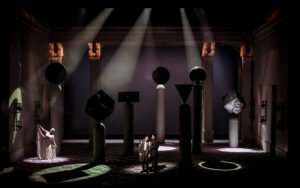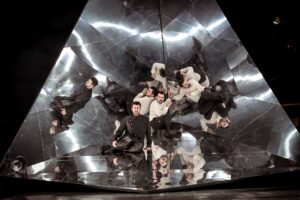History has beautifully come full circle, almost on the centenary of the premiere of King Roger, when most reviewers rightly interpreted Szymanowski’s opera as a metaphor for the changes taking place in Europe’s social consciousness at the time. In June 1926, after a performance at Warsaw’s Teatr Wielki, Henryk Opieński wrote about the victory of “the Dionysian concept of life over a king in the fetters of Byzantine religious rigour, his wife, his entourage and, finally, his entire people”. The audience received the composer’s new work surprisingly well, although it featured neither a clearly defined amorous intrigue, nor a murder leading to a plot twist, nor a final conclusion – none of the elements associated with opera, even in the minds of modernist spectators. The listeners were seduced primarily by the music: at the time Szymanowski was experimenting with pentatonics, dissonances and blurring of the transparency of “European” harmonic verticals. There was as much Orient in the score as there was antiquity drowned in a modernist dream. As much a Greek – or essentially Nietzschean – dispute between the Apollonian and Dionysian elements, as a struggle with one’s own longing, sensuality and sexual orientation.
The few opponents accused King Roger of either having a worthless libretto or going astray into Wagnerian epigonism. Ironically, Szymanowski’s work is, indeed, a “post-Wagnerian” opera, although it is by no means epigonic – the composer at time gets into a lively argument with the author of Parsifal and Tristan und Isolde, an argument ending with a mysterious hymn to the sun, an antithesis of “Liebestod”, as it were, in which the protagonist undergoes transfiguration not through death, but through worship of the life force, self-awareness, darkness-destroying power. Such a manifesto was needed at the time and was interpreted correctly in Europe, as is evidenced by, for example, the glowing reviews in the German press after a performance directed by Alexander Schum at the Stadttheater Duisburg in 1928, which made history primarily because of a demonstration by the nationalist Stahlhelm paramilitary militia. The real triumph, however, came with the premiere of King Roger at the Národní Divadlo in Prague, in 1932, in a staging by Josef Munclingr.
Crowd scene. In the foreground Vit Nosek (Edrisi) and Jiří Brückler (Roger). Photo: Marek Olbrzymek
Raised by his uncle František, a musician at the Municipal Theatre in Lviv, after the untimely death of both parents, Munclingr went on to study at the local conservatoire and at the philosophical faculty of the University of Lviv. He made his debut as an opera singer in 1911 at the age of just twenty-three, signing the bass role of Colline in La Bohème. One year later he was already singing in Prague. Before the outbreak of the Great War he became a soloist with the Stadttheater in Poznań. From there he moved to Warsaw, where he first got engaged by Teatr Wielki and then in 1919 he briefly joined the company of Teatr Stołeczny, also as a stage director. Szymanowski referred to him as “half-Czech, half-Pole”. Although in 1921 Munclingr returned to the land of his ancestors for good, he never severed his ties with his adopted homeland. At Prague’s Národní Divadlo he not only staged King Roger, but also prepared the stage premiere of Harnasie. After the Second World War he appeared in the episodic role of Kuśmirak in Aleksander Ford’s film Border Street. In addition, he appeared several times at the Poznań and Wrocław Opera Houses. He also translated Wyspiański’s tragedy Judges into Czech. Yet he went down in history of primarily the Czechoslovak opera scene: as the performer of Dikój and, at the same time, stage director of the famous Bratislava premiere of Janáček’s Katya Kabanova; as an outstanding stage director and theatre theorist; as a man who contributed to the heyday of Prague’s Národní Divadlo during Otakar Ostrčil’s musical directorship; as a true expressionist successfully pulling the domestic scene out of the greyness of bourgeois realism. He caused ferment in Brno as well: in 1951 he became an associate professor at the local Academy of Performing Arts, helping to establish the country’s first opera directing department.
Vladimír John, a recent graduate of the Brno Academy, made his debut on the Moravian stage precisely with King Roger. And he was undoubtedly successful in that: lasting less than an hour and a half (with a few cuts in the score), played without an interval, the production turned out to be both a tribute to the tradition of modernist theatre and an attempt, modern in its spirit, to place the narrative of the opera beyond time and space. The attempt corresponds – paradoxically – with the intentions of Iwaszkiewicz and Szymanowski, who intended their work to be a clash of myth and archetypes with a crisis of the familiar world order, a parable, as it were, about the struggle of reason, emotion and subconsciousness, in which Sicily was only a pretext, an island from the composer’s memories and phantasmagorias. It is difficult to say whether the Shepherd is a phantom from Roger’s “bloodied dreams”, a newly discovered aspect of the ruler’s personality – as the director suggests – or genuinely a stranger, an unknown god in human form, an incarnation of Dionysus, an emanation of Shiva, all in one?
John’s vision is presented in Martin Chocholoušek’s sparse set, the essential elements of which remain unchanged, which does suggest that the conflict unfolds in the realm of spirit rather than matter. Perfectly lit by Martin Chloup, in Act One it creates an vivid illusion of the Cappella Palatina, bathed in dispersed rays of dusk; in Act Two it evokes the atmosphere of the Orient in a space filled with surreal shapes bringing to mind a parade of lingams, symbolic representations of the god Shiva; in Act Three it is striking in its contrast of darkness and blinding brightness of the interior of a mirror pyramid, where Roger completes his pilgrimage into himself and sets off into the mysterious dawn.
Veronika Rovná (Roxana), Jiří Brückler and Vit Nosek. Photo: Marek Olbrzymek
Chocholoušek’s beautiful set design concept, irresistibly bringing to mind Munclingr’s legendary stagings, was not quite matched by Barbora Rašková’s costumes, which seemed to be coming from too many aesthetic orders: most convincing in the opening scenes with the chorus dressed in Bauhaus-inspired geometric attires, least convincing in the motley human-animal retinue of the Shepherd. What was also excessive was the choreography of Jan Kodet and Michal Heriban, who unnecessarily entrusted the singers with some of the dance tasks. These are, however, minor caveats: Vladimír John’s impressive debut, the first staging of King Roger in years in which the director has not superimposed additional layers of meaning on an already convoluted libretto, is another proof of the vitality of Czech opera theatre – one of the few in Europe that has not got into a rut and, miraculously, has not gone deaf to the music.
And this time, too, there was something to listen to. It’s been a long time since I saw such a coherent and thus thrilling take on Szymanowski’s masterpiece as the one that came from the baton of Robert Kružík, the new music director of Janáčkovo divadlo as of next season. Kružík is a genuine opera conductor: he skilfully weighs the proportions between the stage and the orchestra pit, does not overwhelm with the power of sound, and gives room to both soloists and the well-prepared, masterfully dynamic choruses. Instead of stratifying the seemingly incoherent sound planes of King Roger, he turned them into a glittering, colourful fresco, juxtaposing the hieratic chanting of the clergy with the sensual softness of the Shepherd’s aria, the ecstasy of Roger with the oneiric nature of Roxana’s song, the sweeping, tangled chords of Dionysian frenzy with the equivocal, “dark” clarity of the protagonist’s final sacrifice.
Jiří Brückler and Vit Nosek. Photo: Marek Olbrzymek
Nor were there weaknesses in the solo cast either. Jiří Brückler, who has a baritone that is mature and expressive, yet velvety and lyrical in timbre, created a highly convincing portrayal of the internally torn ruler. Veronika Rovná, with her bright, colourful soprano and exceptionally smooth, musical phrasing, came to full form in the second act – if it had not been for the slightly too harsh top notes, her Roxana would have ranked among the top interpretations in the old, “pre-war” style, which for some reason has been abandoned by most Polish singers. The light tenor of Vit Nosek (Edrisi) consistently gained strength of expression over the course of the narrative. Jana Hrochová and David Szendiuch were excellent in the episodic roles of the Deaconess and the Archbishop.
Yet I did not expect I would be so electrifyingly impressed by Petr Nekoranec as the Shepherd – judging from Szymanowski’s correspondence, a role written with an almost impossible voice in mind: androgynous, ambiguous like Dionysus, amorphous like Shiva. And such a voice has indeed been found. Some peculiarities of Nekoranec’s technique – a distinctive vibrato and a tendency to sing high notes in a mixed voice, nowadays generally frowned upon in the tenor repertoire – fit this part like a glove, especially when combined with his disturbingly sensual phrasing. This may have been the sound of Vladimír Tomš, the Czech Shepherd from the 1932 Prague production. Perhaps it was under Tomš’s influence that the composer finally came to appreciate King Roger – writing with sadness after the Prague premiere that “I probably won’t be able write anything like this again”. It’s so good that someone can still sing it.
Translated by: Anna Kijak



